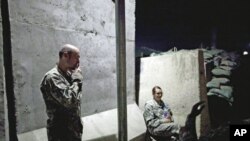A bipartisan group of U.S. lawmakers is calling on President Barack Obama to draw up plans to hasten the withdrawal of all U.S. combat forces from Afghanistan. The president announced more than a year ago that he plans to begin pulling out U.S. troops this July, but he has said the pace of withdrawal will be dictated by events on the ground.
A group of Democratic and Republican lawmakers held a news conference Thursday to call on the Obama administration and the Pentagon to provide a concrete timeline of their plans to end U.S. military operations in Afghanistan. Democratic Congressman James McGovern of Massachusetts said that one of the primary reasons for invading Afghanistan in 2001 had been to kill or capture al-Qaida leader Osama bin Laden.
"The American people want us to get out of Afghanistan. They want us to go after al-Qaida. But they have long since realized that al-Qaida is not in Afghanistan," said McGovern. "I remind you that we found Osama bin Laden in Pakistan, hundreds of miles away from the Afghan border."
A number of progressive Democrats have been calling for a speedy end to U.S. military operations in Afghanistan for some time, and it appears that the killing of bin Laden is likely to boost the calls. Most Republican lawmakers support staying in Afghanistan as long as necessary. But Republican Congressman Walter Jones of North Carolina said that at a time of debate in Congress on drastic cuts to domestic government spending, he cannot support funds for what he says is a corrupt government in Kabul.
Related Carolyn Presutti video report
"Here we are cutting programs for the American people," said Jones. "Senior citizens are being told, 'No, no more sandwiches for lunch,' children are being told 'No milk' in the morning. And yet, we are spending $8 billion a month to prop up a corrupt leader. And I think the American people are sick and tired of spending money in foreign countries that we do not have, and telling the American people 'we can't help you have a sandwich.' That is pretty pathetic."
Several of the lawmakers mentioned widespread corruption in Afghanistan.
Democratic House Minority Leader Nancy Pelosi did not join in to co-sponsor the bill that calls for a withdrawal plan. But she said that when she last visited Afghanistan in March, everyone was focused on handing over authority from U.S. forces to Afghan control.
"Everyone that I met, from the ambassador to the generals, to the soldiers and Marines that we met along the way, were all about the transition out," said Pelosi. "We know the American people are weary of this war; we simply cannot afford it."
Earlier this week, Republican House Speaker John Boehner said this is not the time to back away from U.S. commitments in Afghanistan and Pakistan.
"Our fight for freedom and liberty around the globe continues. We face a complex and dangerous threat, even today. It is important that we remain vigilant in our efforts to defeat terrorist enemies and protect the American people. This makes our engagement in places like Pakistan and Afghanistan more important, not less," said Boehner.
At a Senate hearing earlier this week, a number of lawmakers also expressed increasing frustration with the longest war in U.S. history. But former State Department official Anne-Marie Slaughter warned senators that limiting U.S. operations in Afghanistan already has been tried - with disastrous results that prompted the president to order a temporary surge in U.S. forces deployed there. Slaughter said clearing Taliban strongholds and bolstering the Afghan government could help bring about a negotiated end to the war.
Obama has not indicated that the successful operation by U.S. special forces to kill bin Laden will alter his 2014 target date for withdrawing all U.S. military forces from Afghanistan. But the president could face a challenge from Congress, as public opinion surveys show that the American people have soured on the 10-year war. A recent CNN-Opinion Research Corporation public opinion survey indicates that 52 percent of those Americans polled oppose the U.S. war in Afghanistan, and only 42 percent are in favor of it.




